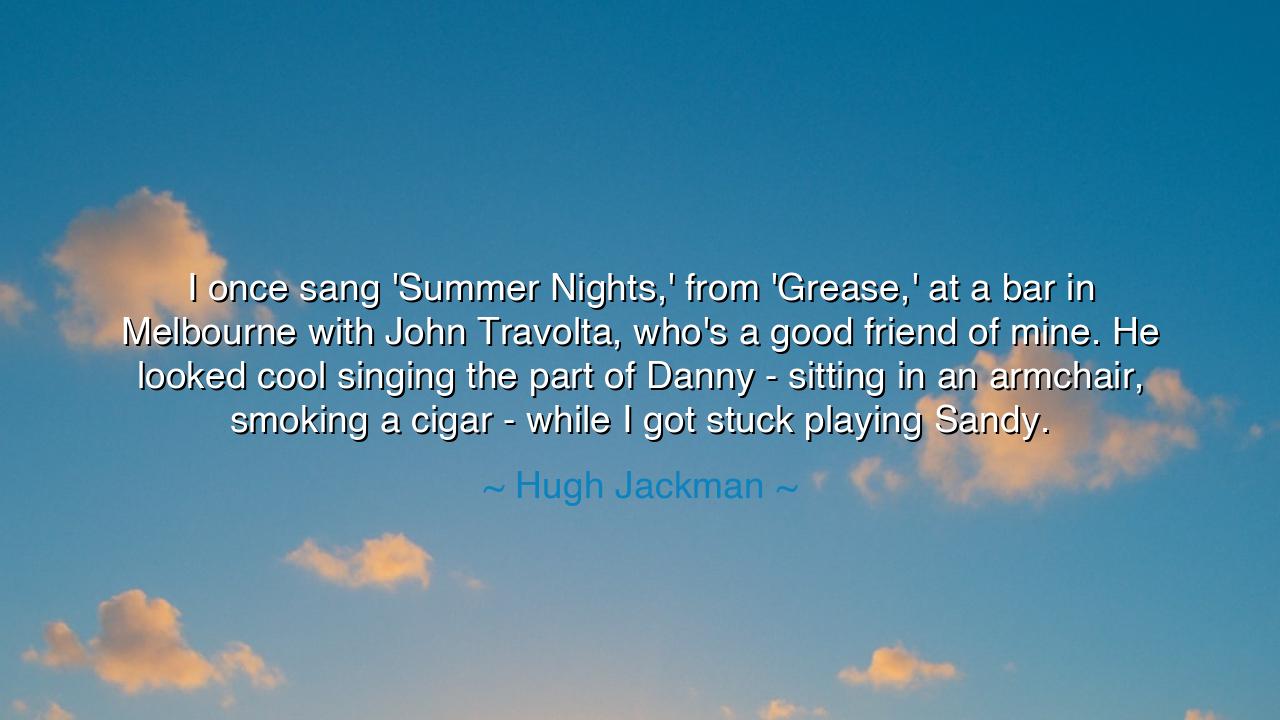
I once sang 'Summer Nights,' from 'Grease,' at a bar in Melbourne
I once sang 'Summer Nights,' from 'Grease,' at a bar in Melbourne with John Travolta, who's a good friend of mine. He looked cool singing the part of Danny - sitting in an armchair, smoking a cigar - while I got stuck playing Sandy.






"I once sang 'Summer Nights,' from 'Grease,' at a bar in Melbourne with John Travolta, who's a good friend of mine. He looked cool singing the part of Danny - sitting in an armchair, smoking a cigar - while I got stuck playing Sandy." These words, spoken by Hugh Jackman, reflect not only a humorous personal anecdote but a deeper insight into the roles we play in life and the varying perceptions of coolness. In this tale, we see the contrast between John Travolta, embodying the confident, suave Danny from Grease, and Hugh Jackman, who, in his own words, found himself in the role of Sandy—the sweet and innocent counterpart. Yet, it is not the roles themselves that are significant but the dynamic between them, and the nature of coolness in relation to our own actions and perceptions.
In the ancient world, heroes and gods often found themselves in roles that were determined not by their personal desires but by the needs of the world around them. In Greek mythology, Hercules was bound to perform twelve labors, not because they suited him, but because they were the tasks he was chosen to undertake for the greater good. Much like Jackman and Travolta’s roles in the impromptu performance, their roles were not chosen by them but were assigned, yet both performed with dedication and purpose. This reflects the notion that coolness is not always about the role one is given, but how one embraces and performs it. Hercules, despite facing daunting challenges, became an enduring symbol of strength because he took on his assigned duties with resolve and bravery.
Jackman’s playful reflection about his own role as Sandy provides a modern glimpse into the truth that coolness can be found in unexpected places. The ancient Chinese philosopher Laozi taught that the wise person does not seek recognition or fame but understands that true virtue lies in accepting whatever role life gives and performing it with humility and grace. Coolness, then, is not a matter of playing the main part or being the most admired but of playing your part to the best of your abilities, whatever that may be. In the case of Jackman, he could have seen his role as Sandy as a lesser or undesirable part, but instead, he embraced it with a sense of humor and joy, which in itself is a mark of authenticity.
Consider also the story of the Renaissance artist Leonardo da Vinci, who was not only a painter but also an engineer, inventor, and scientist. In many ways, Da Vinci's brilliance lay not in his pursuit of any one role but in his ability to excel at whatever role he embraced. Whether painting the Mona Lisa or designing flying machines, he poured passion and dedication into everything he did. Similarly, Jackman’s willingness to take on the role of Sandy in the performance with Travolta speaks to this same commitment. It is not the character of Sandy or Danny that matters, but the spirit with which each is brought to life.
The contrast between Jackman’s role and Travolta’s in that performance is also a reminder that in life, we often find ourselves in roles that do not match the image others may have for us. Yet it is in these moments that we have the opportunity to shine—not because of the role itself, but because we bring our own authenticity and spirit to whatever we do. Travolta’s coolness was not merely in his portrayal of Danny, but in his ability to embrace the moment with confidence. Likewise, Jackman’s humor and self-awareness in stepping into the role of Sandy allowed him to own the situation, making it his own, and in doing so, found his own coolness.
The lesson here is that we should never underestimate the value of the roles we are given, whether in life, work, or relationships. The roles we play may not always be what we would choose for ourselves, but it is how we perform them that matters. Coolness, in the truest sense, comes from authenticity—from embracing the roles life gives us with grace and humility, and from finding joy in doing so. Just as Jackman didn’t shy away from playing Sandy but embraced the role with humor and a sense of fun, we too must learn to embrace whatever comes our way, knowing that in doing so, we create our own coolness.
In your own life, when faced with roles that don’t seem to fit, remember the story of Jackman and Travolta. Instead of feeling limited by the parts you are given, see them as opportunities to express yourself fully, and find joy in the process. Your coolness is not determined by the role you play but by how you choose to embody it with authenticity, humor, and heart. Embrace the roles life hands you, for in doing so, you create a legacy of grace that will endure beyond the moment.






AAdministratorAdministrator
Welcome, honored guests. Please leave a comment, we will respond soon